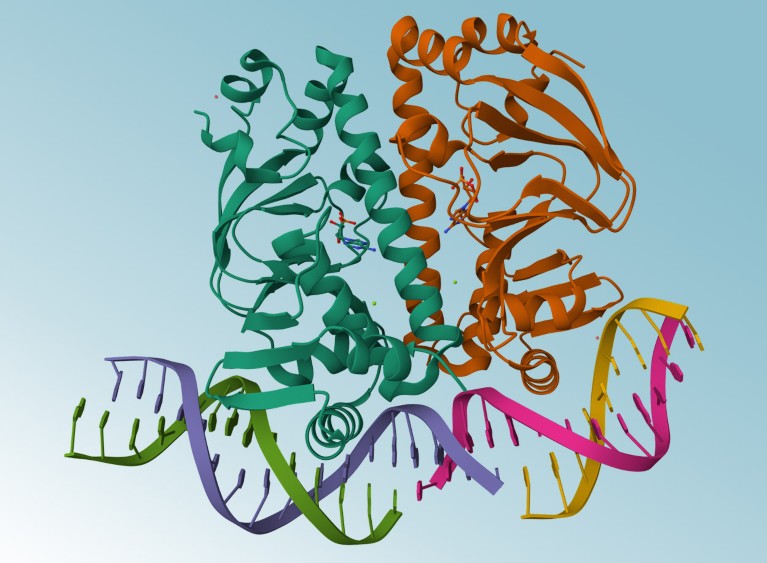
AlphaFold3 can predict the structures of proteins as they interact with DNA.Credit: Werel et al./American Society for Microbiology, Mol*, RCSB PDB
DeepMind, the AI-focused subsidiary of Google, has officially open-sourced AlphaFold 3, the latest version of its revolutionary protein structure prediction tool. This announcement has sent waves through the global scientific community, as AlphaFold 3 promises to dramatically enhance the pace of discoveries in biology, biotechnology, and pharmaceutical development.
A Leap Forward in Protein Prediction
AlphaFold 3 represents a significant advancement over its predecessors. While AlphaFold 2 made headlines for its unprecedented accuracy in predicting protein 3D structures, AlphaFold 3 takes this capability further by introducing tools to model interactions between proteins and other biological molecules, such as DNA, RNA, and small ligands. This new functionality is a game-changer for researchers studying complex biological systems and pathways, as it allows for a deeper understanding of how proteins interact in vivo.
Additionally, AlphaFold 3 incorporates improvements in scalability and computational efficiency, enabling scientists to analyze larger proteins and molecular complexes with reduced processing time. This makes it not only a scientific but also a practical asset for labs worldwide.
Addressing Transparency and Accessibility
The decision to open-source AlphaFold 3 follows months of discussion within the scientific community. DeepMind had faced criticism for initially withholding the source code, with some researchers arguing that closed systems hinder reproducibility and scientific transparency. Acknowledging these concerns, DeepMind now offers AlphaFold 3's source code freely for non-commercial use.
Researchers can download the software to perform protein structure predictions, but access to the model weights requires an application process. This safeguard ensures responsible use while still empowering academic institutions and nonprofit organizations to harness AlphaFold 3's potential.
Implications for Life Sciences and Drug Development
The open-sourcing of AlphaFold 3 is expected to catalyze breakthroughs across multiple disciplines. In the pharmaceutical industry, for instance, AlphaFold 3 enables faster identification of drug targets by mapping the structures of disease-related proteins and their binding sites. Scientists can also simulate protein-protein and protein-ligand interactions to predict how drugs might behave in the body, significantly shortening the development timeline for new therapies.
Moreover, in synthetic biology and protein engineering, AlphaFold 3 facilitates the design of novel proteins with tailored functions, such as enzymes for industrial applications or antibodies for precision medicine. The tool is already being applied to challenges like antimicrobial resistance and rare genetic diseases, underscoring its versatility.
A Recognized Scientific Breakthrough
AlphaFold’s transformative impact has not gone unnoticed. In 2024, Demis Hassabis, CEO of DeepMind, and senior research scientist John Jumper were jointly awarded the Nobel Prize in Chemistry for their contributions to protein structure prediction. The prize highlights the significance of AlphaFold as a tool that bridges artificial intelligence and life sciences, opening doors to entirely new fields of study.
Global Collaboration and Future Directions
By open-sourcing AlphaFold 3, DeepMind aims to foster greater collaboration among researchers worldwide. This democratization of cutting-edge AI technology ensures that labs in low-resource settings can benefit from the same tools as well-funded institutions, leveling the playing field in global research.
Looking ahead, researchers expect to expand AlphaFold’s applications beyond proteins. There is growing interest in adapting the technology for studying other complex biomolecules, such as polysaccharides and lipid membranes, as well as multi-protein assemblies and entire organelles.
Conclusion
The release of AlphaFold 3 marks a historic moment in the application of AI to biology. By making this powerful tool accessible to the scientific community, DeepMind has set the stage for rapid progress in understanding fundamental biological processes, designing next-generation therapeutics, and tackling some of the most pressing challenges in medicine and biotechnology. As researchers worldwide begin to integrate AlphaFold 3 into their workflows, its impact on science and human health will undoubtedly be profound and enduring.
Paper: https://www.nature.com/articles/d41586-024-03708-4?utm_medium=organic_social&utm_source=wechat&utm_campaign=CONR_NAJRN_ATT1_AP_CNCM_002EB_weeklybrf





Post comments